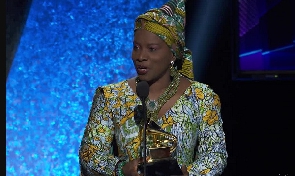 Angélique Kidjo’s acceptance speech for Best World Music Album for Celia. Photo: GRAMMY.com
Angélique Kidjo’s acceptance speech for Best World Music Album for Celia. Photo: GRAMMY.com
Angélique Kidjo is a Beninese singer-songwriter, actress, and activist with a net worth of $5 million, according to Celebrity Net Worth. The five-time Grammy awards winner is renowned for her wide range of musical influences and inventive music videos.
Kidjo was born in Cotonou, Benin in July 1960 and rose to the apex of world music using African-themed songs that have won her many awards and recognition. She was named one of the Top 100 Most Inspiring Women in the World by The Guardian, “The undisputed queen of Africa music” by The Daily Telegraph and “Africa’s premier diva” by Time magazine. She received the 2015 Crystal Award from the World Economic Forum of Davos in Switzerland.
Kidjo released her debut album, Pretty, in 1981. In addition, she has worked with artists like Alicia Keys, Carlos Santa, and Ziggy Marley. Aside from music, she is also into acting. She starred in the 2015 Nollywood movie The CEO.
Kidjo’s rise to stardom
As previously reported by Face2Face Africa, Kidjo was born into a performing arts household. But her journey to becoming one of Africa’s greatest artists began in Paris, France in 1983.
The multicultural epicenter of modern Europe long before other major cities, Paris has played host to artists, intellectuals and romantics. It has to be said that it was France, for better or worse, that forced Kidjo’s Africanness to show.
As she herself would later say: “I refuse for anyone to tell me who I am because I know who I am.” She was not going to be French or European but she had to be something. In Paris, she was introduced to a wide range of cultures and sounds and that afforded her the ability to experiment. That is where she also met her husband, Jean Hebrail, the French producer, composer, and bassist.
Kidjo’s first few years in Paris were spent studying and performing with various local groups. But she would soon start writing songs too as she did for the Dutch pianist Jasper van ’t Hof. The Beninoise had not gone to France as a novice in music. She already had a moderately successful album back home.
Between 1990 and 1998, Kidjo released five albums. Her sound was unique and not in a cliche kind of way; hit tracks such as Wombo Lombo, Agolo, Naima and Batonga were all produced during that period.
Kidjo sang in Fon, her native tongue. She also did in Yoruba, English and French, putting together sounds from jazz, samba, salsa, soul and even reggae and hip hop. She also retained the then-embryonic sound of Afrobeats as well as Francophone African traditions.
The subjects treated by Kidjo in these albums were those close to her heart. They were her truths, realities all too familiar growing up in Ouidah, Benin. For instance, in Logozo, a Billboard chart-topping album, Kidjo discussed homelessness, freedom and the environment. Record producers are not going to be very excited about their female artists doing that, whether in 1991 or 2019.
Still, through all of this, Kidjo’s looks, or appearance, mattered. Her visual appeal went with the music, tapping mainly from the voodoo culture from Benin and other parts of West Africa. This was unproblematic for her. For a way of life so often mischaracterized even by Africans, Kidjo was confident in relaying the artistic expressions fundamental to what she knows is African.
On this, she said, “The richness of Africa, culturally, is vast. That’s the challenge that we have to face, because most of the time, people in the Western world, their attention span is really narrow.”
Kidjo, therefore, set her own task: taking Africa to the world. For her, this was non-negotiable as an artiste.